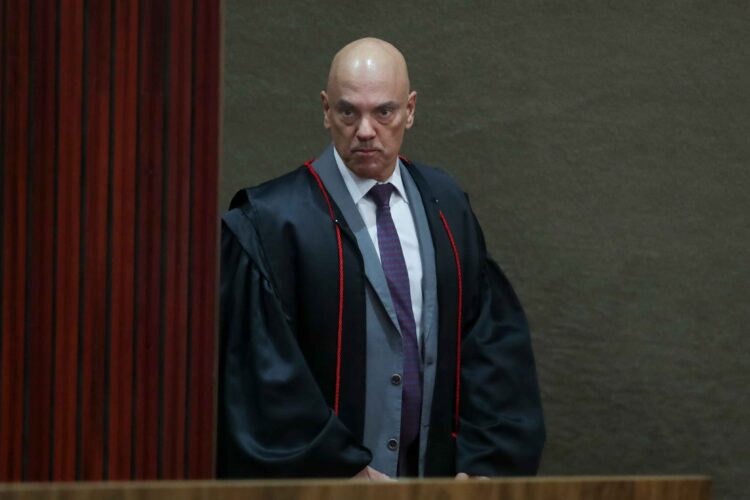Brazilian Supreme Court Justice Alexandre de Moraes began a formal investigation into Elon Musk and his social media company X on Sunday with the intent to ban the platform. The probe was triggered after Musk refused to meet the court’s orders to restrict and/or suspend certain popular accounts that the left-wing Brazilian administration identifies as transmitters of misinformation.
The action to investigate Musk, introduced by Moraes, is part of a wider initiative to dismantle the “digital militia,” a term that pro-censorship factions have applied to users they believe are using misinformation to undermine democracy in Brazil.
In response to orders from the Brazilian government to ban users, Musk wrote: “We are lifting all restrictions. This judge has applied massive fines, threatened to arrest our employees and cut off access to in Brazil. As a result, we will probably lose all revenue in Brazil and have to shut down our office there. But principles matter more than profit.”
Learn the benefits of becoming a Valuetainment Member and subscribe today!
Musk told Brazilian X users that they could get around the government’s shutdown of the platform by using virtual private networks (VPNs). He additionally attacked Moraes, accusing him of suppressing free speech and violating the Brazilian constitution.
Moraes is a long-time political operative whose bolstering of government authority to the detriment of individual freedoms has earned him enemies among populists.
“Is there now, or has there ever been, a modern democracy where a single judge wields the power that Alexandre de Moraes does in Brazil? I can’t think of any example that even comes close,” journalist Glenn Greenwald asked in January 2023. “One of the greatest ironies of Moraes’s extraordinary popularity among the corporate media and the left was that he served as Minister of Justice, and was later appointed to the STF, by a president and government widely considered at the time to be not only illegitimate, but a “coupist.””
Existe agora, ou já existiu, uma democracia moderna onde um único juiz exerce o poder que Alexandre de Moraes possui no Brasil? Não consigo pensar em nenhum exemplo sequer próximo.https://t.co/7z3JPFTdB0
— Glenn Greenwald (@ggreenwald) January 10, 2023
Moraes intervened to a significant extent in the 2020 election, banning right-wing users from social media who denied the election outcome and arresting security officials he blamed for negligence during the storming of the Brazilian capitol.
Both conservative and progressive outlets have described Moraes as a dictator who has increasingly dismantled civil rights in the country. Venezuelan journalist Edgar Beltran, writing for The American Conservative, said:
“Imagine that, in the U.S., a Supreme Court justice who is the president and vice president’s long-time associate orders some people be jailed without trial for posting threats on social media. Further, he sentences a congressman to nine years in prison for online threats to the Court. Then, he launches an investigation of fake news that leads to dozens of social media accounts being blocked and posts being removed and the messaging app Telegram being temporarily blocked throughout the country; he also orders raids on businesspeople without much evidence of wrongdoing.
Then the January 6 riot happens. Further emboldened, the Supreme Court justice suspends a sitting governor from his job, continues banning online voices, and jails, without bail, hundreds of people who did not enter the Capitol and just protested nearby.
This is precisely what is happening in Brazil. Alexandre de Moraes, a Brazilian Supreme Court justice that also heads the country’s Supreme Electoral Court, has accumulated power such that many, inside and outside Brazil, both left and right, are asking whether Brazil is slowly turning into a judicial dictatorship or, as many legal experts in Brazil call it, a juristocracia.”
Or, as Environmental Progress writes: “To counteract the alleged establishment of a dictatorship, De Moraes has been suppressing civil rights in ways similar to various dictatorships around the world, like China and Venezuela. Many legal experts have condemned De Moraes’ actions in the STF and have pointed out several issues with the operations,” citing “overly broad operation,” “conflict of interest,” “legal basis for State of Siege,” “unexecuted action,” “the special jurisdiction,” and “double standard and hypocrisy.”
 Shane Devine is a writer covering politics and business for VT and a regular guest on The Unusual Suspects. Follow Shane’s work here.
Shane Devine is a writer covering politics and business for VT and a regular guest on The Unusual Suspects. Follow Shane’s work here.


















Add comment